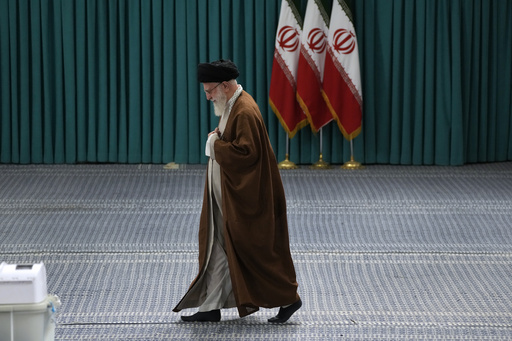
TEHRAN, Iran — The recent actions taken by the United States have seemingly been met with approval from the Iranian government, despite them being initiated by a figure that Iranian operatives have purportedly been planning to kill.
President Donald Trump’s decision to halt foreign aid spending and potentially reform or even dissolve the U.S. Agency for International Development has received positive coverage in Iranian state media.
Reports suggest these changes may obstruct funding aimed at supporting those who challenge Iran’s Shiite theocratic regime, including pro-democracy activists, as part of the U.S. government’s global democracy promotion efforts.
Simultaneously, Iranian officials appear to be awaiting a signal from Trump regarding potential negotiations concerning Tehran’s advancing nuclear program. With billions of dollars in sanctions hanging in the balance, the future of a program that could lead to weapons-grade uranium enrichment looms large.
Trump hinted at an interest in dialogue even while he signed an executive order to reintroduce his stringent policies against Iran, suggesting he may wish to engage with Tehran moving forward.
Amid these geopolitical dynamics, everyday Iranians express concern about the implications for their livelihoods. Following Trump’s announcement, the Iranian currency, the rial, plummeted to an unprecedented low of 850,000 against the dollar, highlighting the enduring economic instability that has worsened over the years—as it was valued at 32,000 rials to the dollar just a decade ago.
“It encourages hard-liners inside Iran to continue repressing people because they feel the U.S. would have diminished capability to support Iranians seeking freedom,” remarked Maryam Faraji, a 27-year-old waitress in northern Tehran.
Iranian media have claimed Trump’s cuts could cripple any opposition movements within the country. The state-run IRNA news agency noted that slashing the foreign-based opposition budgets might adversely affect the relationship between Tehran and Washington.
Conservative outlets like Hamshhari labeled Iran’s opposition as “counterrevolutionaries” who had prematurely celebrated Trump’s election as a sign of the Islamic Republic’s impending decline, only to now confront unexpected reductions in support.
The reformist newspaper Hammihan expressed a similar sentiment, describing the cuts as a “cold shower” for activists abroad, a sentiment echoed by the Iranian Foreign Ministry.
Esmail Bagahei, the Foreign Ministry spokesperson, emphasized that these funds are not mere donations but rather payments for services rendered.
He criticized U.S. interventionist policies, particularly during the Biden administration, which sought to economically pressure Iran and meddle in its domestic affairs via financial assistance.
The exact impact of these funding cuts on Iranian activists remains unclear, considering that the bulk of civil society funding has been through the U.S. State Department’s Near East Regional Democracy fund, initiated as a response to the 2009 Green Movement protests.
In 2024, the Biden administration requested $65 million for this fund, which had received over $600 million in appropriations by Congress previously. The allocated funds have been directed towards efforts like training journalists and activists to document human rights violations and facilitating internet access amidst governmental restrictions.
The State Department has not provided any comments regarding the future of this funding, and concerns remain about the safety of activists targeted by Iranian authorities, particularly as U.S. officials have kept details about beneficiaries under wraps due to security risks.
Moreover, Iran has noticed a lack of direct criticism from the U.S. during a recent United Nations Human Rights Council meeting, leading some Iranian officials to speculate that Trump might be open to negotiations.
Supreme Leader Ayatollah Ali Khamenei recently hinted that there “is no harm” in engaging in talks with the “enemy,” although he cautioned against being naive about potential deceptions in diplomatic gestures.
Bagahei clarified that while Tehran has not received any clear indication to proceed with talks, Iran is eager to convey its willingness to engage. Reformist President Masoud Pezeshkian has advocated for officials to heed the voices of the Iranian populace and avoid further suppressive measures, reminiscent of the retaliation following the 2022 Mahsa Amini protests.
During Trump’s signing of the executive order, he warned of dire consequences for Iran should he be harmed, yet left open the possibility for dialogue, stating, “We will see whether or not we can arrange or work out a deal with Iran.” However, he affirmed that, “They just can’t have a nuclear bomb.”
Despite the potential for dialogue, there remain factions within Iran’s ruling structure that might resist negotiations for various reasons, including the fallout from Trump’s 2020 drone strike that resulted in the death of influential General Qassem Soleimani, which ignited fervent calls within Iran for retribution against Trump.
Iranian commentator Ahmad Zeiabadi conveyed skepticism, asserting that while some moderates might interpret Trump’s actions positively, the hardliners would remain resistant to talks.
For many of Iran’s over 80 million citizens grappling with an unstable economy, speculation about diplomatic negotiations feels far removed from their daily realities.
Taxi driver Gholanhossein Akbari reflected on the situation, asserting that Iranians like himself had not benefited from U.S. support for foreign-based pro-democracy activists, saying, “We did not see any result from the funds the U.S. paid to foreign-based Iranian activists who only make comments in the media.”

